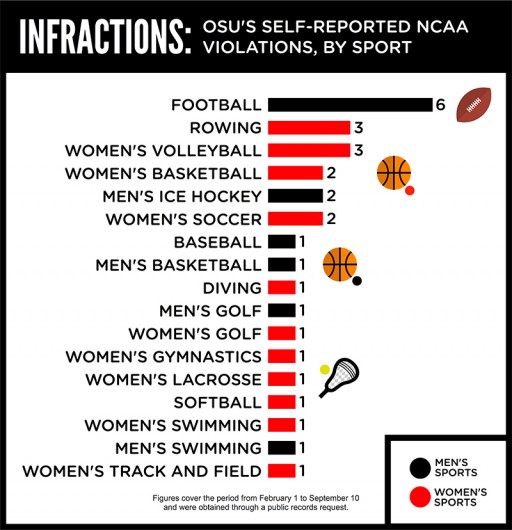
Credit: Denny Check / Managing Editor of Design
An appearance at a celebrity softball game, a Bluetooth mishap and a room-service bill were among 29 self-reported violations the Ohio State Department of Athletics filed to the NCAA from Feb. 1 to Sept. 10.
This information was obtained through a public-records request submitted by The Lantern on Sept. 11 and received on Oct. 16.
In one case, an OSU football player was told that he was neither permitted to participate in nor attend the Joe Haden Celebrity Charity Softball game in Cleveland on June 6. However, on the morning of the event he called his position coach and was told he could attend the event but not participate.
Because the school had not provided written approval to attend, a violation had occurred. An OSU spokesman could not confirm the identity of the player, but redshirt junior quarterback Cardale Jones was documented to have attended the game.
In response to the violation, a letter of education was provided to all football coaches and staff emphasizing the rules regarding promotional activities, as well as reviewed with football student-athletes.
In another violation involving a member of the football team, redshirt senior quarterback-turned-H-back Braxton Miller posted a picture to his Instagram account on March 24 that showcased the nutritional supplement AdvoCare. The OSU Compliance Office became aware of the violation and told Miller to delete the post. Miller was declared immediately ineligible but was reinstated by the NCAA on April 11.
Of the 29 violations reported to the NCAA, six involved the football team, the most of any of OSU’s 36 varsity teams.
Just one involved the men’s basketball team, a case in which a player received money for expenses and competed in two exhibition games on OSU’s preseason trip to the Bahamas in August 2014. The player had not yet received academic certification from the NCAA Eligibility Center due to complications from receiving his high school transcript, as he had attended two schools.
He was certified on Oct. 3, 2014, but his 45-day temporary certification period had already been triggered by participating in extra practices allowed by the foreign tour. As a result, he had participated in five practices after the 45-day period expired and received financial aid prior to the certification.
As a result, the player was withheld from six practices, and OSU had to pay $500 for each exhibition game he participated in.
The women’s basketball team reported two violations, including one in which a recruit visited with her mother and stepfather. The mother and stepfather attended only one of the three meals planned by the institution, instead accumulating a bill of $252.16 from room service and the hotel’s restaurant, exceeding the limit of $50 per meal.
OSU determined the prospect had received an impermissible benefit as a result and declared the prospect ineligible until she repaid the bill.
The other report involving the women’s basketball team involved former OSU guard Amy Scullion, who graduated at the end of the 2013-14 season with one year of eligibility remaining but chose to forgo it to attend medical school.
Scullion received a $5,000 postgraduate scholarship from OSU toward graduate school and also received $150 for an autograph signing at a sports memorabilia store.
After the team was hit by a rash of injuries before the season, Scullion returned as a graduate student for her redshirt senior season. She was made ineligible because of the benefits, but because of her claim that she would not have taken them if she had originally intended to return for a fifth season, she was allowed to play after repaying the $150 received for the autographs and serving a three-game suspension.
In a violation involving women’s volleyball coach Geoff Carlston, a phone call was made to a 2017 recruit from the hands-free calling feature in his car. Carlston had intended to call an incoming 2015 athlete who shared a name with the 2017 recruit.
Carlston spoke with the father of the pre-contactable 2017 athlete for several minutes, before realizing that it was the wrong player. The Compliance Office ruled that the team would be unable to contact the 2017 prospect until Sept. 15, two weeks after the first permissible date.
Only one of the 29 violations were deemed to require additional action from the NCAA after the Compliance Office’s original declarations.
In it, the men’s hockey team held a camp for prospects during a dead period on April 16. The Compliance Office ruled that the coaches use a contact for each prospect attending the camp, which counted as one of their seven permissible recruiting opportunities per prospect.
However, the NCAA took further action, requiring OSU to reduce its number of permissible contacts by one as a result of the violation.
Apart from the celebrity softball game and AdvoCare post, the other four violations involving the football team related to an ineligible player traveling to the Sugar Bowl, an incident involving coach Urban Meyer and an assistant coach inadvertently calling the same prospect in the span of less than a week, OSU special teams coordinator Kerry Coombs taking a photo with high school football coaches he is friends with and an OSU player tweeting about a 2016 prospect.
A full list of the 29 self-reported violations can be viewed here.


